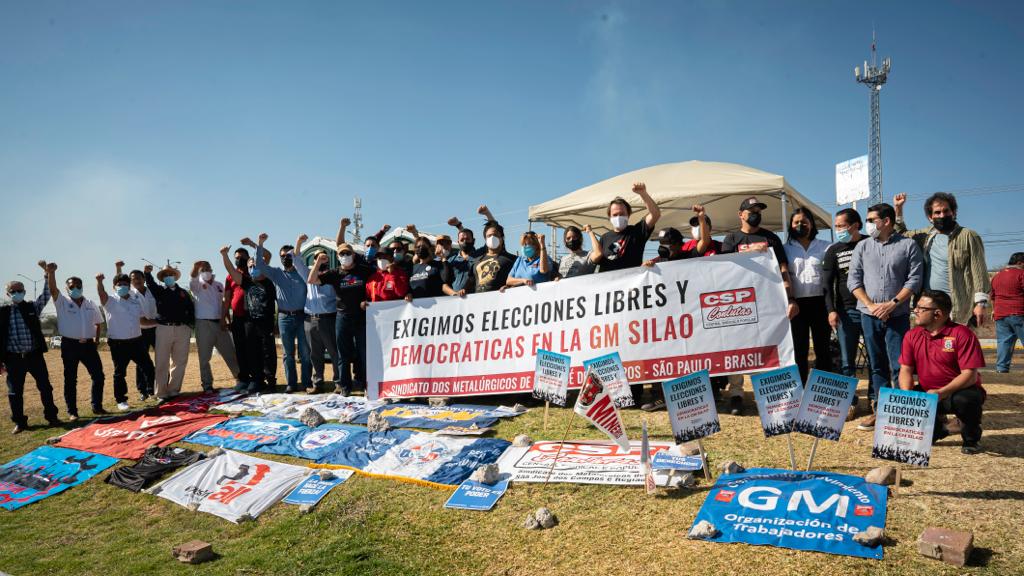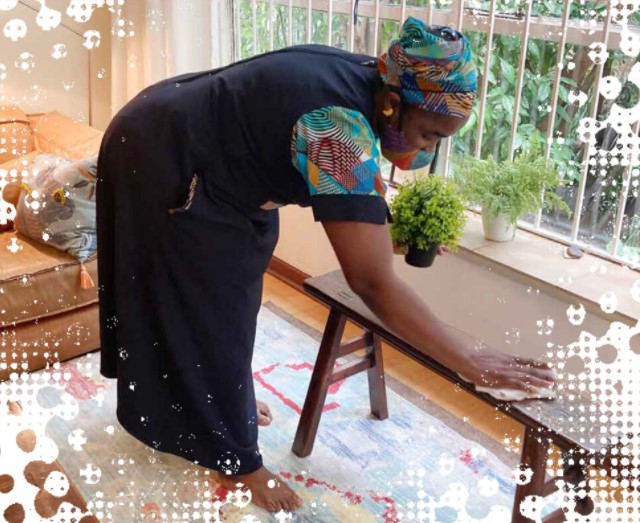Feb 28, 2022
“Dave Welsh, country director for Thailand and Myanmar of the Solidarity Center, spoke with The Diplomat’s Luke Hunt about growing support for independent trade unions as the COVID-19 pandemic continues to punish regional economies, forcing businesses to restructure–which all too often leaves workers stranded without compensation.”

Feb 28, 2022
Violence broke out on Wednesday, February 23, as Haitian police opened fire on garment workers demonstrating for higher wages and killed a reporter, according to witness reports. Two other reporters were injured at the scene in Port-au-Prince.
Maxihen Lazzare, who worked for Haitian media group Roi des Infors, died of his wounds at a hospital on Wednesday. Haitian police responded to Lazzare’s death in a press release saying they are launching an investigation and that the police are implicated.
The union coalition released a statement denouncing Wednesday’s violence and condemning “the kind of conspiracy of the police and employers to block the mobilization to force us to accept a minimum wage that cannot meet our needs so that they can continue to suck blood and exploit workers.”
Protests have been ongoing since Haitian workers staged a peaceful demonstration calling for an increase in the minimum wage earlier this month. In January, a coalition of nine trade unions issued an open letter to the prime minister seeking a minimum wage increase from 500 gourdes (about $4.82 a day) to 1,500 gourdes ($14.62). They noted that wages have been stagnant for years while the increasingly high cost of living and rising inflation were eroding workers’ ability to live with dignity.
In response to garment worker demands, the government mandated a new minimum wage earlier this week, bumping pay to about $6.53 a day.
In 2019, the Solidarity Center conducted a wage assessment, with Haitian workers and their unions, and found that garment worker wages then covered less than a quarter of the estimated cost of living.
Unions around the world are pushing back against anti-union violence. Earlier this month labor leaders from several countries stood against anti-union violence in Mexico.

Feb 24, 2022
A study conducted by Insan-Leilek, a Kyrgyz migrant worker foundation, and the Trade Union of Migrants of the Kyrgyz Republic documents abuses suffered by many who migrate to Russia to earn their livelihoods as nannies, adult caregivers, cooks, cleaners and live-in domestic workers. An estimated 750,000 Kyrgyz people have migrated to Russia for work; official Kyrgyz government data estimates that half that number are women.
“We are invisible people,” says 34-year-old survey respondent and domestic worker Almagul. (Her last name is withheld to protect her livelihood and personal safety.)
“The Problems of Informal Domestic Workers,” reflects the experiences of 300 Kyrgyz migrant domestic workers, from whom 24 were selected for in-depth interviews by two migrant worker experts. Respondents’ jobs were in the Russian cities of Kazan, Moscow, Novosibirsk, Samara and Yekaterinburg.
The study reveals a wide range of employment abuses among the mostly female domestic workers who were surveyed, including sexual harassment and violence, other forms of physical and emotional abuse, unpaid hours, excessive workloads, denial of time off and wage theft.
More than 80 percent of the female survey participants who provided in-depth interviews reported sexual harassment at the hands of their employers. Of this group, almost 4 percent had experienced severe sexual violence, including rape, while 25 percent were subjected to indecent touching that included unwanted touching of intimate body parts. More than 30 percent of those reporting sexual harassment and violence said they could not ask anyone for help or support and, of this number, 7 percent attempted suicide. More than 70 percent of those providing in-depth interviews said they were often beaten, allegedly for laziness, and that they can rarely go out.
Two survey participants reported having become surrogate mothers for their employers without a written agreement or fair compensation.
Almost 90 percent of the larger group surveyed (300 respondents) were working without a formal contract because they had secured their jobs through personal connections. Such workers are vulnerable to unregulated work in which hours, pay, duties and conditions are determined at the whim of the employer, some of whom are unscrupulous and exploitive.
“I worked 24 hours a day, and I looked after the children, cooked, did the laundry. Weekends were out of the question,” reports Miraida about a job she held in Russia when she was 18.
Kyrgyz domestic workers in Russia provide an average of 10 hours of work per day, a survey of the larger group of 300 found. Of these, those who live in an employers’ home are working an average of more than 12 hours per day. More than 40 percent said they perform additional services that were not agreed with the employer at the time of hiring, without adjusted compensation.
Respondents were recruited for the survey through Trade Union of Migrants of the Kyrgyz Republic WhatsApp groups and Insan-Leilek diaspora organizations and migrant communities. In-depth interviews were conducted online and over the phone.
Russia is the main destination for approximately 750,000 of Kyrgyzstan’s labor migrants. Official data on the percentage of migrant women employed in domestic work in Russia does not exist.
Insan-Leilek foundation and the Trade Union of Migrants of the Kyrgyz Republic are actively engaged in anti-trafficking programs in Kyrgyzstan, with Solidarity Center support, including last year’s “100 Days Against Trafficking in Persons” youth campaign.

Feb 16, 2022
Following Haitian unions’ open letter to the prime minister demanding an increase in the minimum wage, factory workers in the nation’s capital staged a peaceful protest outside the SONAPI industrial park in Port-au-Prince on February 9 and 10.
Videos and photos posted on Twitter showed large crowds pouring into the Metropolitan Industrial Park in the Port-au-Prince community of Delmas. Demonstrators danced to music and held up tree branches, a popular symbol of uprooting or change.
Police fired tear gas, injuring more than a dozen workers, most of them women. The industrial park—which is home to 16 manufacturers, including garment and electronic factories, and employs at least 12,000 workers—was shut down on Thursday as the demonstration continued. Central union confederations (Confederation of Haitian Workers (CTH), Confederation of Workers in the Public and Private Sectors (CTSP), National Central of Haitian Workers (CNOHA) and EntèSendikal Premye Me-Batay Ouvriye (ESPM-BO)) denounced the actions of Intervention and Law Enforcement Corps (CIMO) against peaceful protesters, calling it [English translation] “torture and other cruel, inhuman and degrading treatment.”
Workers at factories producing textiles and other goods make just $4.82 (500 gourdes) per day for eight hours of work and are demanding an increase to $15 (1,500 gourdes) per day. Three years have passed since the wage has increased. Their demands come as a sharp rise in inflation has increased the cost of basic goods and services such as transportation, health care, and education to as much as three times the current minimum wage.
In 2019, the Solidarity Center conducted a wage assessment, with Haitian workers and their unions, and found that garment worker wages then covered less than a quarter of the estimated cost of living.
Workers are continuing peaceful demonstrations until their demands are met.

Feb 3, 2022
The new, independent union, Sindicato Independiente Nacional de Trabajadores y Trabajadoras de la Industria Automotriz (SINTTIA), won the right to represent more than 6,000 workers at a truck plant in Silao, Mexico, in a closely watched election. SINTTIA won the election by a wide margin, defeating the entrenched CTM labor group that had held the contract at the plant for 25 years, and two other groups with ties to CTM.
SINTTIA won with 4,192 votes out of 5,389 valid ballots, in an election with 90 percent turnout. The three CTM unions combined won just over a thousand votes.
The victory happened despite attempts to buy votes and intimidate workers, and threats of violence leveled against union leaders and activists. One of those threatened was SINTTIA General Secretary María Alejandra Morales Reynoso. She spoke about the victory at a press conference.

SINTTIA General Secretary Maria Alejandra Morales Reynoso / Credit: Solidarity Center
“Today is a day in history for Mexican workers,” says Morales Reynoso. ” And we have just begun.”
SINTTIA’s victory could signify the beginning of the end of CTM’s decades-long hold on power. The labor group derived its strength from secret contracts, intimidation of workers and close relationships with Mexico’s previous ruling party and employers, whom they appeased by keeping wages low.
The election is a significant test of the impact of trade reforms, which expand worker rights and establish union votes by secret ballot to validate labor contracts. Mexico’s government estimates that prior to reforms, about 80 percent of union contracts were signed without workers’ knowledge, and helped suppress wages and give employers more control over workers.
At this one truck plant this week, workers were able to overcome corruption and threats of violence to vote out the sham union. Thousands of workers now have a chance at collective bargaining, raising wages and improving working conditions, but much work remains to ensure free and fair elections at thousands of workplaces for millions of Mexican workers.

Feb 3, 2022
“The dignity of people’s very being is at stake,” said IZWI Domestic Worker Alliance’s founder and lead researcher Amy Tekie in opening remarks at a recent webinar focused on a new qualitative survey of human rights violations against live-in domestic workers in South Africa.

“Really awful things are happening behind closed doors,” said IZWI’s Amy Tekie.
“The Persistence of Private Power: Sacrificing Rights for Wages“—co-published by Johannesburg-based IZWI Domestic Workers Alliance and the Solidarity Center—surveys the constitutional and human rights of live-in domestic workers in South Africa. It describes how domestic workers’ rights to privacy, freedom of movement and children’s right to parental care are frequently sacrificed for wages in a sector underpinned by racism, sexism and classism. Resulting exploitation—largely invisible because of the private spaces in which it occurs—continues regardless of constitutional protections and industry-specific labor regulations.

We are expected to be indoors even when it is our off day,” said the survey’s lead field researcher Theresa Nyoni. Credit: IZWI
“We are not allowed to be seen around,” said the survey’s lead field interviewer, Theresa Nyoni, of a sectional title housing complex in which she was formerly employed as a domestic worker.
Nyoni described almost universally denied opportunities for live-in domestic workers in sectional title housing to enjoy open spaces on, or near, the employers’ property and lack of freedom to move around or receive visitors in their own quarters—even during off hours. And, for most live-in domestic workers, she noted invasive employer surveillance and almost total lack of privacy.
“We are sleeping with kids and not allowed to lock the door; parents barge into the room and even the bathroom,” she said.
Employers isolate domestic workers by routinely denying them visits from friends, spouses and children, and some domestic workers say they are not allowed to leave their employer’s home for any reason. Nyoni described her former employer’s refusal to allow her to leave the work premises, on her own time, to purchase and arrange for transportation of bulk food items to her own children during the pandemic.
“When I held a plate of food to eat, I was thinking: Did my children get food today?”
Survey interviewees outlined living conditions that Tekie described as “almost kidnapping [in its] constant and complete employer surveillance and control.” Besides being isolated from loved ones, many live-in domestic workers said they were denied employer permission to keep their infants with them, receive packages or use their employer’s kitchen to preserve and prepare their own food, and those employed in sectional title housing complexes reported repeated employer and security guard searches. Some live-in domestic workers said they have chosen abortions for fear of losing their jobs.
IZWI interviewed 115 mostly migrant live-in domestic workers for the survey, most of whom were working in or near Johannesburg—where working conditions are anecdotally better than those than in rural areas, said Tekie. Approximately half of South Africa’s more than 800,00 domestic workers live in by IZWI’s estimate, although definitive data does not yet exist, she said.

The survey affirms that state silence perpetuates the status quo, said McGill University Faculty of Law Professor Adelle Blackett.
McGill University Faculty of Law Professor of Transnational Labor and Development Adelle Blackett underscored the significance of the report being centered on the lived experience of domestic workers and the persistence of private power in their lives, even post-Apartheid.
Describing the report as “chilling,” Blackett defined the status quo for South Africa’s domestic workers as, “historicized, racialized, intersectionalized enslavement to domestic servitude.”

“[This report] is only the tip of the iceberg,” said former South African Labor Court judge Urmilla Bhoola.
“When domestic workers live in, they forfeit their rights,” she said. And so, civil society legal activism is essential, including that spearheaded by trade unions, she added.
Report recommendations include extension to domestic workers of many of the rights contained in South Africa’s farmworker Extension of Tenure Security Act (ESTA) but absent from Sectoral Determination 7 governing domestic work. ESTA guarantees to farmworkers residing on employers’ land “the right to human dignity”—including privacy, having family life, the freedoms of association, movement and religion, and to have visitors and receive postal communication.” Alternatively, concludes the report, legislation specific to the domestic work sector should be created that includes:
- Minimum housing standards for all live-in domestic workers, not only those paying rent
- Basic regulations on rights to family life and visitors, including the right for family to cohabit with a worker, within residential density laws, and the right for workers to have visitors in their homes
- Regulations to protect privacy, explicitly preventing employers from searching rooms, phones or property without permission
- Clear protection of a worker’s right to move freely during off hours
- Guidelines on bullying, harassment and assault, as those provided in the labor law do not address the specifics of the domestic sector
- Guidelines for provision of food.









